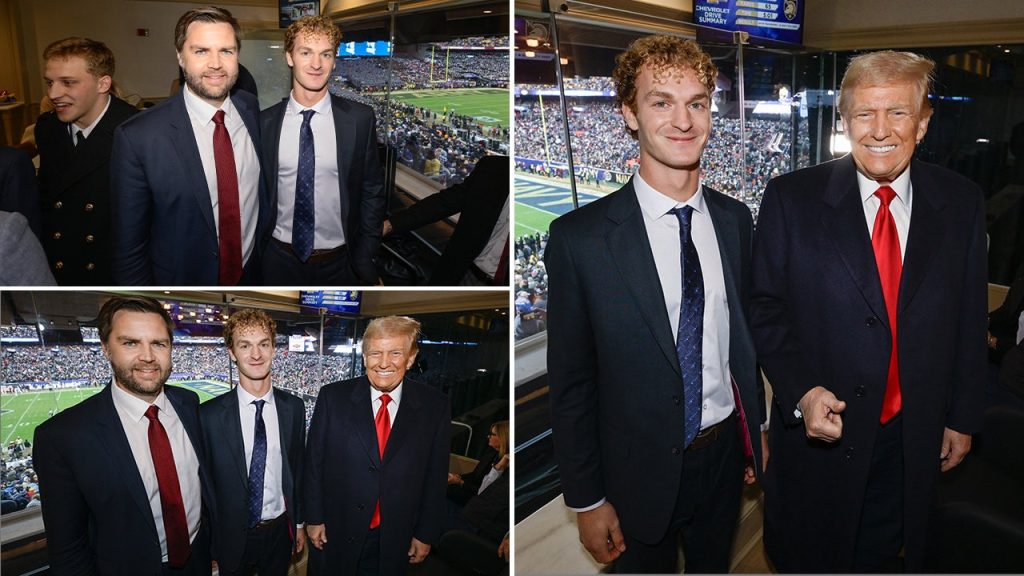Paragraph 1: The Acquittal and the Celebration
Marine veteran Daniel Penny, recently acquitted of manslaughter in the highly publicized subway chokehold death of Jordan Neely, found himself in the unexpected company of prominent political figures at the 125th Army-Navy football game. Hosted in a suite by President-elect Trump, Penny mingled with Vice President-elect JD Vance, Elon Musk, Tulsi Gabbard, House Speaker Mike Johnson, Vivek Ramaswamy, and Trump’s prospective FBI director, Kash Patel. Photos of Penny with Trump and Vance rapidly circulated across social media, sparking a surge of support for the veteran, with many proclaiming him a hero and lauding his actions on the subway.
Paragraph 2: Social Media Reactions and Calls for Recognition
The online response to Penny’s appearance at the game was swift and largely positive, particularly among conservative voices. Crypto influencer Tiffany Fong shared photos and hailed Penny as a hero, while X influencer Nick Sortor advocated for him to be awarded the Presidential Medal of Freedom. Donald Trump Jr. also chimed in with a post declaring, "Common sense reigns again!" This wave of online support reflected the existing polarization surrounding the case, with many viewing Penny’s actions as justifiable self-defense.
Paragraph 3: Financial Support and Racial Undertones
Vivek Ramaswamy, along with his son, shared a photo with Penny, highlighting their prior contribution to his legal defense fund and expressing their continued support. Simultaneously, author Ashley St. Clair framed the case in racial terms, suggesting that Penny was persecuted for being a white man. Her statement echoed the underlying racial tensions that fueled much of the public discourse around the trial, with some arguing that Penny’s actions were racially motivated. The prosecution’s repeated references to Penny as "the White man" during the trial further exacerbated these racial dynamics.
Paragraph 4: The Subway Incident and the Trial
The incident that led to Penny’s trial took place on a New York City subway car on May 1, 2023. Jordan Neely, a homeless man with a history of schizophrenia, entered the train and began shouting threats. Witnesses testified that Neely’s behavior was unusually aggressive and frightening, leading Penny to intervene. Neely’s past criminal record, active arrest warrant, history of psychosis, and documented use of K2, a synthetic marijuana, became key points of contention during the trial. The defense argued that Penny acted in self-defense and to protect other passengers, while the prosecution maintained that his use of force was excessive and negligent.
Paragraph 5: The Verdict and its Aftermath
On December 9th, the jury delivered a verdict of not guilty on the charge of criminally negligent homicide, sparking celebrations from Penny’s supporters in the courtroom. Conversely, Neely’s family and Black Lives Matter activists expressed outrage and grief. Penny subsequently thanked the jurors for their courage in delivering the verdict in what he perceived as a challenging political climate. In an interview, he maintained that he would act similarly if faced with a comparable situation again, emphasizing his belief that inaction would have led to greater harm.
Paragraph 6: Continuing Legal Battles and Political Support
Despite the acquittal, Penny’s legal battles are not entirely over. He faces a civil lawsuit filed by Neely’s father, Andre Zachary, who alleges negligence and recklessness. The lawsuit seeks unspecified damages for assault and battery, ensuring the case’s legal and financial ramifications will continue to unfold. Meanwhile, JD Vance, among the first politicians to publicly support Penny, reiterated his admiration for the veteran’s courage and expressed satisfaction that Penny accepted his invitation to the Army-Navy game. This high-profile support underscores the political implications of the case, which has become a focal point in discussions about race, mental health, and self-defense in public spaces.

